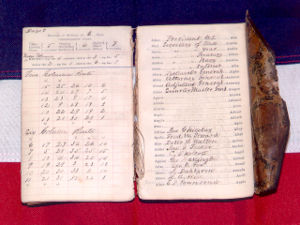
Codebook
Encyclopedia

Cryptography
In cryptographyCryptography
Cryptography is the practice and study of techniques for secure communication in the presence of third parties...
, a codebook is a document used for implementing a code
Code (cryptography)
In cryptography, a code is a method used to transform a message into an obscured form, preventing those who do not possess special information, or key, required to apply the transform from understanding what is actually transmitted. The usual method is to use a codebook with a list of common...
. A codebook contains a lookup table
Lookup table
In computer science, a lookup table is a data structure, usually an array or associative array, often used to replace a runtime computation with a simpler array indexing operation. The savings in terms of processing time can be significant, since retrieving a value from memory is often faster than...
for coding and decoding; each word or phrase has one or more strings which replace it. To decipher messages written in code, corresponding copies of the codebook must be available at either end. The distribution and physical security
Physical security
Physical security describes measures that are designed to deny access to unauthorized personnel from physically accessing a building, facility, resource, or stored information; and guidance on how to design structures to resist potentially hostile acts...
of codebooks presents a special difficulty in the use of codes, compared to the secret information used in cipher
Cipher
In cryptography, a cipher is an algorithm for performing encryption or decryption — a series of well-defined steps that can be followed as a procedure. An alternative, less common term is encipherment. In non-technical usage, a “cipher” is the same thing as a “code”; however, the concepts...
s, the key, which is typically much shorter.
The United States National Security Agency
National Security Agency
The National Security Agency/Central Security Service is a cryptologic intelligence agency of the United States Department of Defense responsible for the collection and analysis of foreign communications and foreign signals intelligence, as well as protecting U.S...
documents sometimes use codebook to refer to block cipher
Block cipher
In cryptography, a block cipher is a symmetric key cipher operating on fixed-length groups of bits, called blocks, with an unvarying transformation. A block cipher encryption algorithm might take a 128-bit block of plaintext as input, and output a corresponding 128-bit block of ciphertext...
s; compare their use of combiner-type algorithm to refer to stream cipher
Stream cipher
In cryptography, a stream cipher is a symmetric key cipher where plaintext digits are combined with a pseudorandom cipher digit stream . In a stream cipher the plaintext digits are encrypted one at a time, and the transformation of successive digits varies during the encryption...
s.
A codebook is usually made in two parts, one part being for converting plaintext to ciphertext, the other for the opposite purpose. Both are usually organized similar to a standard dictionary, with plaintext words (in the first part) and ciphertext words (in the second part) presented like dictionary headwords.
An example of an algorithm using a codebook is the MacGuffin cipher
MacGuffin (cipher)
In cryptography, MacGuffin is a block cipher created in 1994 by Bruce Schneier and Matt Blaze at a Fast Software Encryption workshop. It was intended as a catalyst for analysis of a new cipher structure, known as Generalized Unbalanced Feistel Networks...
.
Social sciences
In social sciencesSocial sciences
Social science is the field of study concerned with society. "Social science" is commonly used as an umbrella term to refer to a plurality of fields outside of the natural sciences usually exclusive of the administrative or managerial sciences...
, a codebook is a document containing list of codes
Coding (social sciences)
Coding refers to an analytical process in which data, in both quantitative form or qualitative are categorised to facilitate analysis....
used in research.
Data compression
Codebooks were also used in 19th- and 20th-century commercial codeCommercial code (communications)
In telecommunication, a commercial code is a code once used to save on cablegram costs . Telegraph companies have always charged based on the length of the message sent—and this has not changed since the 19th Century...
s for the non-cryptographic purpose of data compression
Data compression
In computer science and information theory, data compression, source coding or bit-rate reduction is the process of encoding information using fewer bits than the original representation would use....
.

